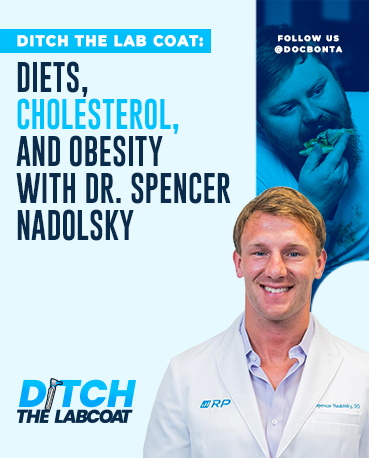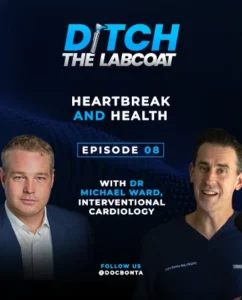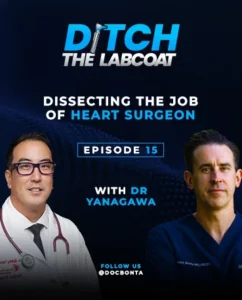This episode was a ton of fun – I absolutely loved diving into these topics and learning about Dr. Nadolsky’s self-experimentation! It was an absolute joy to host Dr. Spencer Nadolsky, a renowned lipid specialist who’s been making waves with his no-nonsense, evidence-based takes on diet, cholesterol, and—dare I say it—the future of obesity management.
So, if you’ve ever found yourself confused about whether you should be guzzling Bulletproof coffee, popping statins like Tic Tacs, or jumping on the semaglutide bandwagon, this episode is for you. Here are some of my takeaways!
The Atkins Diet, Twinkie Diet, and Eating Twigs: Do They Actually Work?
Our conversation kicked off with a nostalgic look at the days of the Atkins Diet, where you could lose weight by eating enough bacon to make your arteries cry for help. But hey, it worked… sort of. Dr. Nadolsky reminded me that, technically, you can lose weight on just about anything if you eat fewer calories than you burn. Yes, even on a Twinkie Diet (shoutout to that one professor who famously lost weight eating just Twinkies): Watch it here.
But here’s the catch: Is it sustainable? The answer is a hard no. Sure, you can “white-knuckle” your way through calorie restriction, but let’s be real—eating nothing but processed junk and expecting to be healthy is like trying to run a marathon in flip-flops. As Spencer put it, the best diet is the one you can stick to, which often means foods that are filling, nutrient-dense, and less likely to leave you hungry enough to eat your own hand.
Intermittent Fasting: Diet or Disguised Eating Disorder?
Now, I’ll admit it—I’ve been on the ‘Intermittent Fasting’ bandwagon for a while. It was all the rage in my internal medicine circles. But let’s clear the air: Intermittent Fasting isn’t some magical cure-all. As Dr. Nadolsky pointed out, the real reason it works for some people is because it restricts your eating window, which often leads to eating less overall.
Some people have tried this, but after a few hangry mornings, they bailed. Turns out, if your body is screaming for breakfast, skipping it isn’t the healthiest choice. Dr. Nadolsky agreed, noting that while fasting can work wonders for some, it’s not a one-size-fits-all solution. In fact, my colleague in psychiatry even called it “an eating disorder by another name.” Yikes.
The “Perfect Diet”: Does It Even Exist?
Spoiler alert: there’s no such thing as the perfect diet. Whether it’s keto, plant-based, or the ancient caveman diet (where you hunt your own Cheetos), it all boils down to calorie balance and sustainability.
Spencer emphasized that while the composition of your diet can influence things like cholesterol levels and blood pressure, the biggest driver of chronic disease is excess body fat. He pointed out that diets like the DASH diet (designed to lower blood pressure) and plant-based diets have been shown to reduce LDL cholesterol and ApoB (that sneaky little protein that clogs up your arteries). But at the end of the day, weight loss and fat reduction are the heavy hitters in preventing chronic diseases.
“Body Types” and Burning Calories: Myth or Reality?
Remember those high school health classes where they told you about Ectomorphs, Mesomorphs, and Endomorphs? Turns out, it’s mostly pseudoscience. Dr. Nadolsky debunked this myth faster than you can say “protein shake.”
Sure, genetics play a role in how we store fat, but the reality is that appetite is the biggest driver of body weight. He shared a fascinating nugget: those people who say, “I eat tons of junk but never gain weight” often don’t realize they’re just eating less overall. They might chow down on pizza but unknowingly skip meals later because they’re just not hungry. Meanwhile, those of us who are “blessed” with a bigger appetite might go back for that third slice and still feel peckish.
Medicate or Motivate: Can We Solve Obesity with Pills?
Here’s where things get spicy. Dr. Nadolsky and I delved into the latest in obesity management—semaglutide (Ozempic, Wegovy) and other medications that promise significant weight loss. The data? Mind-blowing. While lifestyle changes alone might result in a modest 5-7% weight loss, these new meds can help patients shed up to 20-25% of their body weight.
And the future? Spencer predicts it may include preventative medications for those genetically predisposed to obesity. Imagine a world where instead of waiting for people to gain weight and develop complications, we prevent it before it even happens. I can already hear the anti-big-pharma crowd sharpening their pitchforks, but let’s face it—the obesity epidemic isn’t going anywhere on diet and exercise alone.
Cholesterol Confusion: To Statin or Not to Statin?
Ah, the age-old debate. Do we really need to put everyone on a statin? Dr. Nadolsky broke it down for me. Turns out, those of us who are healthy but have borderline cholesterol might not benefit much from statins, but if you’ve got a family history of heart disease, it’s a different story.
Spencer himself takes a low-dose statin to keep his LDL levels in check, even though he’s a picture of health. His reasoning? Why not prevent plaque buildup before it starts? The risk is low, the benefits are potentially huge, and let’s be honest—who doesn’t want to keep their arteries squeaky clean?
For more, check out this article: https://jamanetwork.com/journals/jamainternalmedicine/article-abstract/2819821
The Lipoprotein (a) Craze: Should You Care?
We wrapped up our conversation with the latest buzzword in cardiology: lipoprotein (a). If you haven’t heard of it, don’t worry—most doctors didn’t either until recently. This sneaky particle can raise your risk of heart disease, and it’s largely genetic. Right now, there’s no reliable way to lower it, but exciting new therapies are in the pipeline.
Dr. Nadolsky’s advice? Get it checked once in your lifetime, especially if you have a family history of cardiovascular disease. But don’t stress if it’s high—yet. Until there’s a drug that can lower it, it’s just another number on your blood panel.
New Rx PO Muvalaplin for Lowering of Lipoprotein(a) Nov 18,2024
For more on the latest therapies: https://jamanetwork.com/journals/jama/article-abstract/2826683
Final Thoughts: Stop Chasing the Perfect Diet, Start Chasing What Works
After an hour of nerding out with Dr. Nadolsky, one thing became clear: there’s no one-size-fits-all approach to health. Whether it’s weight loss, cholesterol management, or just trying to figure out how to live past 90 without turning into a raisin, it all comes down to finding what works for you.
As always, the best medicine is the one you actually take. And sometimes, the best diet is the one that doesn’t make you want to punch a hole in the wall after a week.
If you enjoyed this conversation, be sure to follow Dr. Spencer Nadolsky on social media for more science-backed advice that might just save your arteries—and maybe even your waistline.
Until next time, keep it real, keep it healthy, and don’t forget to eat your veggies (or your Cheetos, I won’t judge).



